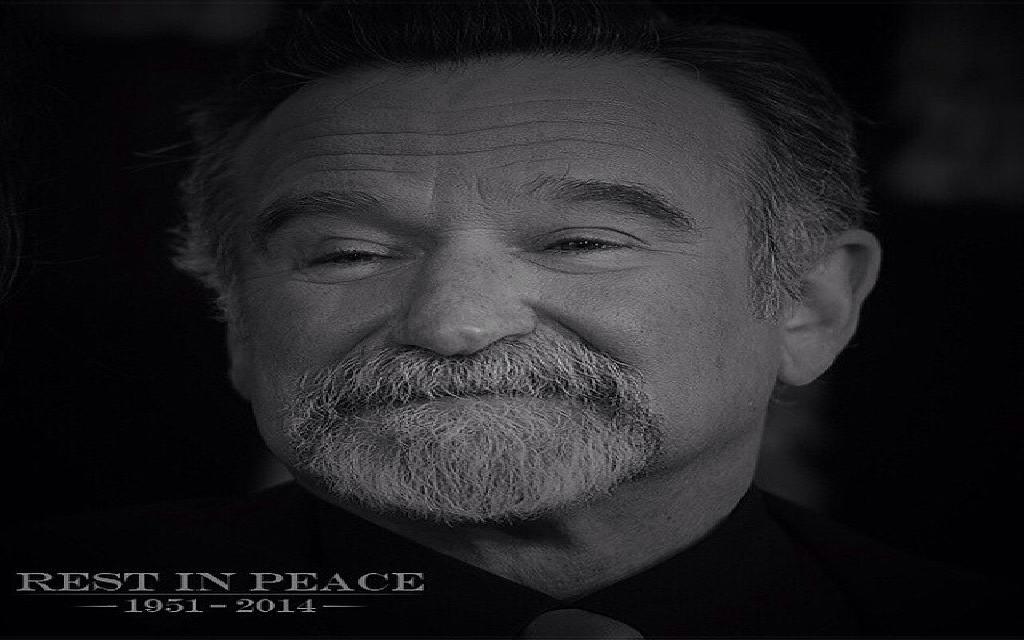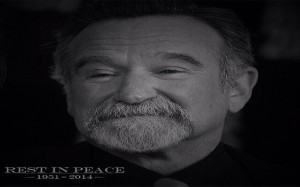It so happens that many of the most creative people on this planet suffer from chronic mental health issues. When mood dysfunction is involved, substance abuse often develops into addiction, which results with the desire to self-medicate.
Robin Williams was known as a very well rounded actor and comic, warm hearted and funny. Though he was very open about his alcoholism, nobody close to him knew of his “depression.” It is my sense that given his manic energy while performing that Robin was most likely a manic depressive suffering from bouts of being “high” on his own brain chemicals as well as being plunged into great depths of depression as he cycled up and down. The alcohol was used to numb away his depressed feelings and have some space where people weren’t able to “get to him” because being a “star” one has little to no privacy – one of the prices one pays to be “famous.” At least that is what he mentioned in an interview that was replayed from years ago on Good Morning America this morning as they payed a tribute to the man’s artistic genius and his great heart.
Most people do not realize this, but 85% of all manic depressives will commit suicide while 20% of depressives will, according to Kay Redfield Jamison, Psychologist in her book, Touched By Fire. Dr. Jamison also has illustrations of many family trees of gifted artist, showing the genealogical connections of families in which these mood disorders are present. It is a stunning, eye opening history that allows my clients to understand from whence their illnesses came.
Dr. Jamison also has graphs depicting the work product of such artists as Vincent Van Gogh, who had been touched by Manic Depression, now more well known as Bipolar Disorder. It is evident how little gets done when one is in a depressed state versus when one is either hypomanic (with poor judgement, yet grounded in reality) or manic (out of touch with reality).
However, there are better ways to treat these people and save their lives then medicating them with the harsh psycho pharmaceuticals that injure their livers or kidneys.
Given my own battle with manic depression from when it was diagnosed in 1989 till it was finally cleared with the use of NLP back in 2004, I understand the cycles of this illness better than many. Though I was lucky enough to never think of self-medicating myself – one of only 15% of the manic depressives out there, I was never at risk for over dosing. It’s been a little over a decade since I was experiencing the symptoms that one would attach to a diagnosis of manic depression – long enough to know that I have beat this illness, psychiatrist and drug free all these years.
How did I do it? Well, the one thing that I realized when I was chemically stabilized on lithium going back to 1990 or so, was that I had a “compelling future,” meaning that I knew that I had things that I wanted to do that were more important to me than allowing my brain to get me “high” on its own. Being one of the lucky ones, when I was ill I spent 6 months of the year naturally “high” with more than enough energy to do anything I wanted or needed to do no matter how physically tired I was. My mind was razor sharp during these times, and yet, I realized that being in this state was unhealthy as my heart was racing. I realized that if I allowed myself to go at such a speed, a heart attack wasn’t out of the question. Learning how to hypnotize others, needing to slow down to my client’s ability to process information was integral in forcing me to slow down. Learning self-hypnosis, I was finally able to calm myself down while figuring out ways to move my life forward, without the need to empty my mind as is required in meditation, something my ex-husband worked very hard to teach me, and yet, I was unable to sit long enough to learn how, much to his dismay.
I have found in my work with my clients since 2002, that if someone has a “compelling future” that is more important than the secondary gains of being ill (getting attention, not having to deal with everyday life as while in rehab, getting disability payments, etc.) they will succeed in healing and no longer demonstrate the symptoms of these mental health illnesses, including drug and alcohol addiction. If one’s unconscious mind is in the way, working hard to protect the client’s conscious mind from learning those things it is unable to deal with, then its best to work in the super conscious mind where the unconscious is taken out of the way, as the conscious is taken out of the way by working in the unconscious mind. It is then possible to help these people to fully heal. It is done in an efficient manner using their talents at going into altered states, making the work even more healing for these creative people. By allowing us to use what they already know how to do to do their healing, this is a very natural manner in which for them to do their healing work. What could make more sense than that? Because in the end there is always a reason for a person to have a mood disorder or a drug addiction, which shows up in the images of the brains in one way or another. However, what is not understood is that given the brain’s plasticity with a neurobiology that is changeable, by using hypnotic techniques we can help heal the client. We do this by changing the perceptions of the client from those that are negative in nature, to those that are positive and helpful in a safe, non-invasive manner using the natural way in which the client’s mind works. What could be better than that?


